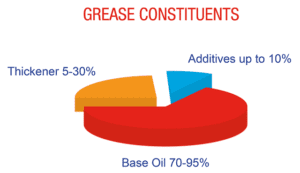The function of grease is very similar to oil however grease and oil are not interchangeable. Grease is used when it is not practical or convenient to use oil. The question comes when trying to figure out which option is the right choice for your application.
Composition of the Oil and Grease
First, let’s look at the difference between the two lubricants. Oil is comprised of a base material and additives designed to protect and clean components. Lubricating greases, on the other hand, are made from a base oil (normally a mineral oil), a thickening agent and performance additives. Typically, the base oil makes up about 80 to 90 percent of the mixture, 10 – 15 percent thickener and 5 – 10 percent performance additives.
The thickening agent is a material that, in combination with the base fluid, produces the solid to semifluid structure. The primary type of thickeners typically used in grease are metallic soaps. These soaps include, among others, lithium, aluminum, clay, polyurea, sodium, and calcium. The base oil that performs the actual lubrication can be mineral oil, synthetic oil, or biobased oil. The thickener gives grease its characteristic consistency and is sometimes thought of as a “sponge” that holds the oil in place. Most greases on the market are composed of mineral oil blended with a soap thickener although the use of synthetic greases and biobased greases are growing. Additives enhance performance and protect the grease and lubricated surfaces.
Most greases – about 75% of the market share – use a lithium-based thickener. These lubricants have excellent water resistance and mechanical stability,  making them well-suited for industrial applications. The lubricant choice for a specific application is determined by matching the machinery design and operating conditions with desired lubricant characteristics.
making them well-suited for industrial applications. The lubricant choice for a specific application is determined by matching the machinery design and operating conditions with desired lubricant characteristics.
Uses for Grease
It’s important to realize that oil and grease are not interchangeable. Some applications specifically require grease and others that oil is a better fit. For example, grease is commonly used in:
- Machinery that operates under extreme conditions such as high temperatures and pressures, shock loads, or slow speed under heavy load. Under these circumstances, grease provides a thicker lubricating film. Oil is typically too thin to properly lubricate in these applications. It’s important to find the best heavy-duty grease for your operation or application.
- Worn components. Grease maintains thicker films in clearances enlarged by wear and can extend the life of worn parts that were previously oil lubricated.
- Parts that may require more re-lubrication. Grease has the advantage of requiring less frequent replenishment thanthan many oil-lubricated systems. Grease can also more readily seal dust and dirt out of the bearings.
Application of Grease
Consistency is the measure of the rigidity of a grease and is one of the most important aspects of grease. It helps determine how well it lubricates without generating too much friction. A grease that is too firm may not feed into areas requiring lubrication, while a grease that is too fluid may leak out. Grease consistency depends on the type and amount of thickener used and the viscosity of its base oil.
Maintaining proper lubrication and understanding of which type of lubricant is best for your equipment is critical. Machinery that’s properly lubricated will last longer and work more efficiently.
Lube-Tech Options
Lube-Tech has numerous options for products that will provide outstanding lubrication for your application. From industrial and food processing uses to wind turbines to automotive and marine, we offer a strong line-up of grease. As the official ExxonMobil distributor for the Midwest, Lube-Tech is approved to handle bulk and packaged Mobil™ lubricants, including the Mobil Delvac™ and Mobil Serv line of products.
Similarly, Lube-Tech Endurance products are exclusively designed, manufactured, and distributed by Lube-Tech. Our fluids consistently meet and exceed the most stringent standards and provide excellent performance in advanced engines and equipment.
Likewise, for over 60 years, Lube-Tech has formulated and manufactured custom fluids in our state-of-the-art facilities. Our advanced lab and testing facilities are staffed by today’s foremost experts in petroleum engineering to help you get the most out of your equipment. We can work with you to develop specific greases to optimize your equipment and improve your bottom line.
Talk to your Sales or Territory Manager or contact us to find the best options to meet your needs.
By Luke Bame, CLS, OMA, Metalworking Certification STLE
